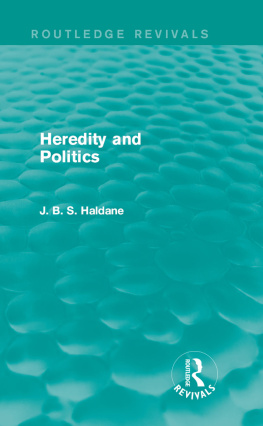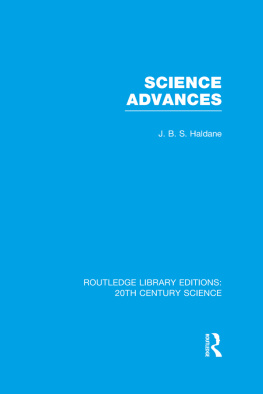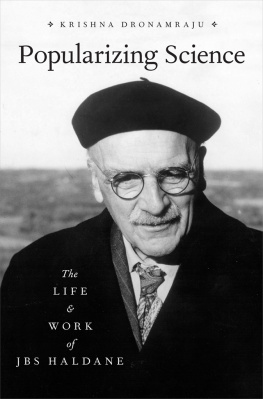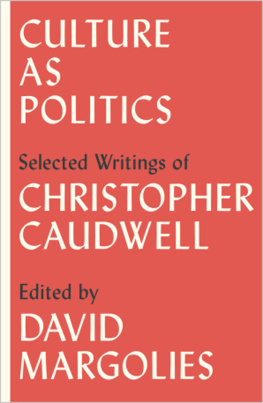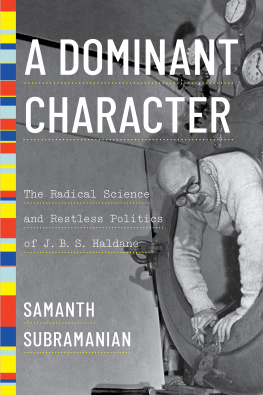Routledge Revivals
Heredity and Politics
This book, first published in 1938, is based on the Muirhead Lectures given at Birmingham University in February and March of 1937. The first half of this book is mainly devoted to an exposition of the principles of genetics, whilst the second half deals with more controversial topics, with the text providing an insight into the ideology of the time. This title will be of interest to students of politics and history.
Heredity and Politics
J. B. S. Haldane
First published in 1938
by George Allen & Unwin Ltd
This edition first published in 2016 by Routledge
2 Park Square, Milton Park, Abingdon, Oxon, OX14 4RN
and by Routledge
711 Third Avenue, New York, NY 10017
Routledge is an imprint of the Taylor & Francis Group, an informa business
1938 J. B. S. Haldane
All rights reserved. No part of this book may be reprinted or reproduced or utilised in any form or by any electronic, mechanical, or other means, now known or hereafter invented, including photocopying and recording, or in any information storage or retrieval system, without permission in writing from the publishers.
Publishers Note
The publisher has gone to great lengths to ensure the quality of this reprint but points out that some imperfections in the original copies may be apparent.
Disclaimer
The publisher has made every effort to trace copyright holders and welcomes correspondence from those they have been unable to contact.
A Library of Congress record exists under LC control number: 38009288
ISBN 13: 978-1-138-95512-7 (hbk)
ISBN 13: 978-1-315-66655-6 (ebk)
HEREDITY AND POLITICS
by
J. B. S. HALDANE
F.R.S.
FIRST PUBLISHED IN 1938
All rights reserved
PRINTED IN GREAT BRITAIN BY
UNWIN BROTHERS LTD., WOKING
PREFACE
IN the last fifty years we have learned something about human biology, and particularly about human inheritance. This knowledge has so far found little application in Britain or America. But it has been used to support proposals for very drastic changes in the structure of society. And the stringent measures which have been taken in Germany, both for the expulsion of Jews from many walks of life, and for the compulsory sterilization of many Germans, are said to be based on biological facts.
I do not believe that our present knowledge of human heredity justifies such steps. I shall doubtless be accused of allowing my political opinions to override my scientific judgement. It is therefore worth pointing out that the questions with which I shall deal cut right across the usual political divisions. For example, the English National Council of Labour Women has recently passed a resolution in favour of the sterilization of defectives, and this operation is legal in Denmark and other countries considerably to the left of Britain in their politics.
It may well be that an increase in our knowledge will fully justify the application to man of certain measures which have led to improvements in the quality of our domestic animals. As one who is endeavouring to increase this knowledge, I can even say that I hope that it will do so. But I believe that the facts concerning human heredity are far less simple than many people think them to be. And I hold that a premature application of our rather scanty knowledge will yield little result, and will merely serve to discredit the branch of science in which I am working.
This book is based on the Muirhead Lectures given at Birmingham University in February and March 1937. I was particularly glad to deliver them owing to my late fathers long association with the university. The lectures in question are supposed to deal with political philosophy. If I am accused of deviating from this subject I can plead that Plato was perhaps the first to deal with eugenics, and that as a matter of fact a full discussion of the origins of human inequality raises a number of quite subtle logical problems. And since Professor Muirhead, in whose honour these lectures are given, is perhaps best known to the general public as the author of The Platonic Tradition in Anglo-Saxon Philosophy, it is not entirely inappropriate that I should deal with one of the very many problems which Plato raised, and about which we are still disputing.
The first half of the book is mainly devoted to an exposition of the principles of genetics, so far as they apply to men and women. I have tried to make it as popular as possible without sacrificing truth to simplicity. And I do not think that many biologists will disagree with the statements there made. In the second part I deal with more controversial topics. Many people will disagree with my conclusions. I hope that those who do so will point out in detail where, in their opinion, my argument is faulty. It is only by such a dialectical method that we are likely to arrive at the truth on this very difficult question.
CONTENTS
I PROPOSE in this book to examine certain suggested applications of biology to political science. In particular I wish to examine certain statements regarding human equality and inequality, some of which have been used to justify not only ordinary policy but even wars and revolutions. In the first chapter I shall quote some statements of five doctrines, and most of the remaining chapters will be devoted to their examination.
We will first consider the doctrine of the equality of man. I will quote from a great revolutionary document of the eighteenth century, the American Declaration of Independence, which was published in 1776 and is mainly due to Jefferson.We hold these truths to be self-evident, that all men are created equal, that they are endowed by their Creator with certain unalienable Rights, that among these are Life, Liberty, and the pursuit of Happiness. This or a very similar doctrine of equality was important for the French Revolution. What did it mean in practice? The thirteenth and fifteenth amendments to the United States constitution were needed to abolish negro slavery and racial discrimination in the matter of the franchise. For whites it meant a very considerable measure of equality before the law, and it has, I think, meant a somewhat greater equality of opportunity than exists in England; but it did not give rise to any systematic attempt to bring about economic equality.
Modern revolutionary theory is much more modest in its statements regarding equality, though its practice goes somewhat farther in that direction. The real content of the proletarian demand for equality is the demand for the abolition of classes. Any demand for equality which goes beyond that, of necessity passes into absurdity. So wrote Engels, and the passage was considerably amplified by Lenin. Modern revolutionary theory looks forward to two types of society; Socialist society in which each citizen works according to his ability and receives in accordance with the amount of work done, and Communist society in which each works according to his ability and receives according to his needs. There is a certain approximation towards Socialist society in the Soviet Union, but Communist society remains an ideal. Neither of these theories is equalitarian. Stalin in a report to the seventeenth Congress of the c.p.s.u. said: Marxism starts out with the assumption that peoples tastes and requirements are not, and cannot be, equal in quality or in quantity, either in the period of Socialism or the period of Communism. Further, so far as I know, official Communist theory includes no clear statement of the origins of inequality other than economic.



